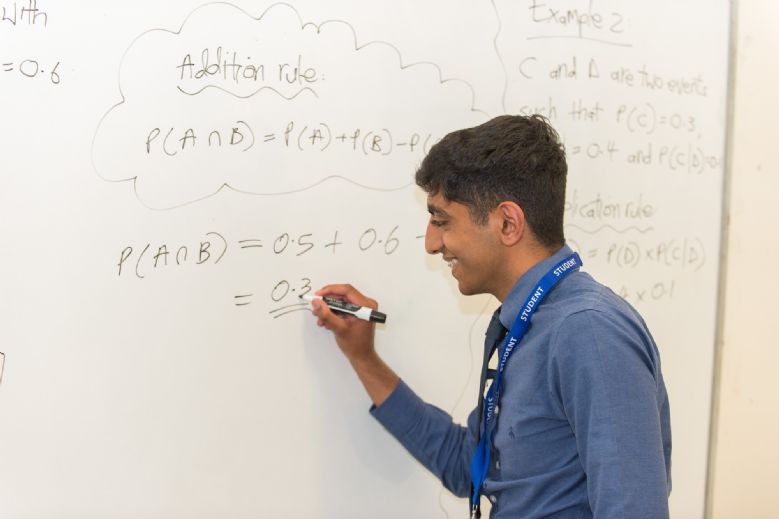Mathematics
FACULTY LEADER: Andrew Fishburn
 Maths is, without a doubt, one of the most important subjects studied. You should be able to count on your maths ability in all walks of life. Maths isn’t just numbers... it's about thinking skills, too. Good mathematicians are logical thinkers and problem solvers. Mathematicians are essential to make society function well.
Maths is, without a doubt, one of the most important subjects studied. You should be able to count on your maths ability in all walks of life. Maths isn’t just numbers... it's about thinking skills, too. Good mathematicians are logical thinkers and problem solvers. Mathematicians are essential to make society function well.
KS3 Curriculum
Our mastery scheme follows the National Strategy Framework for Mathematics. We follow a spiral 5 year scheme of work, which has been modified from the Edexcel 5-year programme of study.
We allocate students to ability groups to ensure that each student is in a set where they can be best helped and encouraged to make the best possible progress. In Year 7 and 9, set movements take place at the end of each half term, based upon half-termly test results, topic check results and the student's attitude to learning and home learning record. In Year 8, set movements are made termly, to match assessment times in Science. Decisions regarding Year 8 set movements are informed by an average of two half term tests, alongside the same criteria as those used in Year 7 and 9. Set movements are agreed between the Maths and Science faculties.
| Half Term One | Half Term Two | Half Term Three | Half Term Four | Half Term Five | Half Term Six | |
|---|---|---|---|---|---|---|
| Year 7 | ||||||
| Year 8 | ||||||
| Year 9 |
KS4 Curriculum
Students sit three Modules, at either Higher or Foundation Tier. Higher Tier includes questions that will stretch the most able, whilst Foundation Tier focuses on core mathematical understanding and skills that all students should aim to master. There is no coursework element at either tier of entry. Students are required to sit three assessments at the end of Year 11. All three papers are one and half hours in length, with one of the three papers being non-calculator.
In Key Stage 4, students are assessed as they progress using Sparx maths, exit tickets combined with Challenge Tasks, alongside end of half term assessments. At the end of Year 10, students sit a reduced GCSE paper and in the December of Year 11, they sit a full mock exam. The results from each test, combined with teacher assessment, are used to make sure that every student is in the correct set and that they are following the correct tier of entry.
Students follow three possible routes:
- Foundation Linear OCR GCSE: 1 non-calculator paper (1hr 30 mins) and 2 calculator papers (1hr 30mins), sat in the summer of Year 11;
- Higher Linear 1 non-calculator paper (1hr 30 mins) and 2 calculator papers (1hr 30 mins), sat in the summer of Year 11;
| Half Term One | Half Term Two | Half Term Three | Half Term Four | Half Term Five | Half Term Six | |
|---|---|---|---|---|---|---|
| Year 10 | ||||||
| Year 11 |
Revision Exams |
Revision Exams |
GCSE Revision Tips
KS5 Curriculum
 Our A level Mathematics course follows the Edexcel specification. The course comprises approximately two thirds Pure Mathematics, one sixth Statistics and one sixth Mechanics. Assessment is entirely by examination, consisting of three 2 hour examinations for the full A Level.
Our A level Mathematics course follows the Edexcel specification. The course comprises approximately two thirds Pure Mathematics, one sixth Statistics and one sixth Mechanics. Assessment is entirely by examination, consisting of three 2 hour examinations for the full A Level.
We run lessons in parallel on Pure Mathematics, Statistics and Mechanics from the start of Year 12. We test students in all three areas during the first half term to ensure that support and advice are in place, as required. There are regular tests and regular home learning is set throughout.
A Level Further Maths is also studied by some students throughout KS5.
Core Maths is also available for students who want to continue to study Maths post GCSE, but not as a full A Level. Core Maths is especially helpful in supporting those students studying subjects that involve increased maths content such as Geography, Science and Product Design.
Assessment
Assessment is carried out throughout the scheme of work using low stake quizzes or "topic checks" as well as online quizzes completed in class or for home learning. Our recall starters help in addressing common misconceptions or gaps in learning from previous lessons or topics. The repetitive nature of these low stake quizzes helps build confidence and improve students’ ability to remember and apply key concepts across different maths assessment strands. Challenge Tasks have been linked to problem solving strands to help address the challenging reasoning and problem-solving content of the new specification. All groups have half-termly assessments which allow us to further identify progress made and areas still to develop.
Enrichment
Throughout their Maths curriculum, students are encouraged to develop their thinking skills and use Maths to solve real-life problems. This functional, reasoning and problem solving element of the Maths curriculum is essential to producing effective mathematicians.
Many of our students are given the opportunity to enter national Maths Challenge competitions and attend various Maths inspiration lectures.
